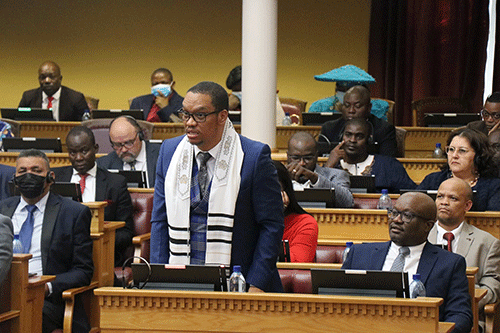Landless People’s Movement leader Bernadus Swartbooi has blasted the national budget deliberations underway in the National Assembly, labelling the debate as a mere shadow of what an actual budget engagement should be.
“The qualitative issues to be discussed are often watered down and this year we have seen how the finance minister dipped the stature of the budget statement to a new low,” said the outspoken former land reform deputy minister while contributing to the national budget debate on Tuesday.
The N$61.5 billion budget was tabled by finance minister Iipumbu Shiimi last month.
The 2022/23 financial year indicated a revenue projection of N$59.7 billion, some 11.7% higher than the estimated revenue for the current financial year.
Swartbooi said Shiimi has often given a thematic layout of the budget focus annually.
“When this year’s focus appears to be youth, and some sort of ‘reimaging’ a better future for the youth, the content and character of the theme is wasted away systematically embarrassingly in his statement,” he said.
Shiimi, according to Swartbooi, places a strong emphasis on what he refers to as “the consultation process” with diverse stakeholders. He, on the other hand, stated that this was not the case.
“We place it on record, here and now, that we were never invited to any such consultation process. This is very unfortunate and lacks political fortitude,” he said.
He said since a thematic approach is taken in the budget statement, LPM would also approach the budget debate from a particular lens.
“Firstly, when will the historically disadvantaged men and women, dressed up in freedom and democracy, as the token of the historic and glorious human achievement, ever live a decent life in post-colonial Namibia?” Swartbooi asked the august house.
He said statistics of statutory bodies established to provide avenues for economic transformation such as the Development Bank of Namibia (DBN) and Agribank show that in the 2020/2021 period, youth accessed loans worth N$82.3 million from DBN, and N$39 million from Agribank.
According to Swartbooi, women stood at N$46 million for DBN and N$44 million for Agribank. He also said SMEs only managed to get N$155 million from DBN over the said period.
“With these minute amounts, these peanuts, what is the minister of finance referring to as he attempts to locate youth as beneficiaries of this year’s budget? It is sad. Who can be a beneficiary of a decent development package, if the figures above are so little?” he questioned.
According to him, in February this year alone, about 1 000 northern-based businesspersons delinked their enterprises from the NCCI, leading to the establishment of an independent business association, Namibian Local Business Association (Naloba).
In large part, he said these businesspersons deem the government as a failure in her posture toward empowerment policies and programmes.
He said the barriers toward business enterprise development, including access to affordable capital, remain stubbornly ill-addressed.
“Adding insult to injury is the inability of the State to allow for ‘accumulation from below’, by its liberalisation of the wholesale and retail sectors, permitting all sorts of new entrants, to compete unfairly against local businesses, in an already squeezed sector, dominated by South African outlets,” he said.
Swartbooi said these are the weaknesses of liberalisation and deregulation in post-colonial Namibia, where citizens are unable to reap business opportunities, as foreign enterprises take up all the business space.
Also, he said the lack of State protection through creative policy instruments for local businesses, to wave off the current headwinds, but also to stabilise and expand their business portfolios and achieve some level of economies of scale, are some of the core concerns of Naloba.
– ktjitemisa@nepc.com.na



